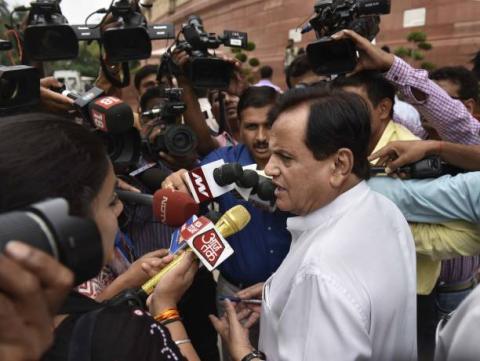
Points: 1. Place of “opposition” in various forms of government.
2. Opposition and the party system
3. Functions of opposition in a democracy
4. During national crises, a democracy gains strength as Govt. and opposition act in concert.
5. Responsible behaviour required of opposition is to work for the nation’s good.
Although the term “opposition” was used as far back as the 18th century to refer to a party or a caucus within an assembly, the suggestion of an established opposition is relatively new. It is now quite normal to refer to a “loyal opposition” and to imply that the interests of the State are as well served by the opposition as by the government itself.
Even in States with high levels of repression it is rare to find no trace of opposition. In single-party systems, the opposition may exist as an underground movement. For example, in the former USSR, where no formal opposition to the Communist Party of the Soviet Union was permitted, dissidents like Boris Yeltsin continued to exist. Or an opposition may engage in armed struggle as in El Salvador. Undue repression of the opposition often results in bloodshed and even change of government through violent means.
In democratic systems, the opposition is officially permitted and recognised. Even the leader of opposition is given an honourable place in the system. In India, the opposition leader has been given certain rights and privileges on par with a cabinet minister, if he commands the support of the required number of Parliament members.
The concept of opposition in the modern democratic state is closely connected with the idea of the political party. The party that is out of the government at a given point of time is called the opposition party. The number of the opposition party/parties may be one or more depending on whether there is a dual-party or multiparty system.
Why does democracy demand the existence of opposition? An opposition party always looks for an opportunity to replace the party-in-government and implement its own policies and programmes. As a result, it serves two purposes. One, the government of the day is prevented from being arbitrary in its actions and negligent of the interests of the people; on the other, the people of a democratic country are offered an alternative in governance of the country.
The opposition parties also enable people who think alike on public questions to unite in support of a common body of principles and policies; Then, to work together to see that those principles and policies are adopted and implemented by the government. Without such an organisation, the people can neither formulate principles easily nor agree on policy.
Out of the many problems which call for solution in a state, the opposition is expected to select those which are comparatively urgent, study them, think out solutions and present them to the people and to the government. And, thus, it acts as a “broker of ideas”. It preserves a sense of continuity in public policy, organises and educates the electorate and helps to carry on and necessitate regular elections. It also dramatizes politics and keeps the nation politically alive. It keeps the government on its toes.
The opposition, like the judiciary, is an agent for safeguarding the Constitution in case the government does something to violate t. The opposition also necessitates periodic interpretation, re-interpretation and amendment of the Constitution to suit changes in times and priorities. In most democracies, the opposition’s views have to be taken into consideration in legislating on socially sensitive matters.
The opposition has the capacity to instil in the government the confidence and ability to deal with national crises. Here, the opposition’s support means that the entire country is behind the government in the hour of crisis. We can recall the thundering speech and support given by Atal Behari Vajpayee in the Parliament (1971) when the Government of India led by Indira Gandhi had to withstand the Pakistani aggression. In the absence of the opposition, the government cannot be sure of the entire population’s support.
In a democracy, the modus operandi of the opposition involves going to the people and criticising the government, giving press statements, debating and discussing issues in Parliament, arousing public opinion, both national and international. In India, submitting a memorandum to the President is also a common practice. All these are commensurate with the democratic norms and contribute to the consolidation and stabilisation of democracy in the social and political system.
To sum up, the opposition fulfils certain necessary functions – so necessary that many competent thinkers consider it essential to the working of representative government. Above all, it is the opposition that puts a control on the power of the government and checks it from becoming absolute. *ZZZ*
